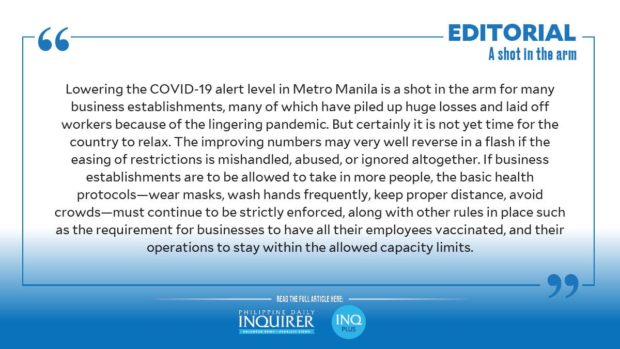
Aside from the easing of quarantine restrictions, the government is also extending assistance to businesses, particularly MSMEs (micro, small, and medium enterprises). The Department of Trade and Industry is opening a loan program to help struggling businesses provide their employees their mandatory 13th month pay this December. “We already reached out to SB Corp. (DTI’s financing arm) to develop a facility that will provide zero-interest loans to companies needing 13th month funding,” said Trade and Industry Secretary Ramon Lopez. The loan amounts are expected to range from P50,000 and P200,000.
Per Lopez’s estimate, some 300,000 workers could go back to their jobs under the latest move to relax quarantine measures. Officials of several business groups welcomed the easing starting Oct. 16. But the private sector wants more, arguing that limiting the operating capacity of businesses to 30 percent is not enough. Benedicto V. Yujuico, president of the Philippine Chamber of Commerce and Industry, said in a TV interview that while being under alert level 3 is better than alert level 4, “this is not going to significantly change the profitability of the companies, or the restaurants, or other businesses. If in fact you have fully vaccinated employees and fully vaccinated clients, why not just open it up instead of imposing certain restrictions on capacity?”
Presidential adviser for entrepreneurship Joey Concepcion said they are still pushing for alert level 1, or a 70-percent capacity for indoor businesses, in the last two months of the year when consumer spending is expected to spike due to the Christmas season. The Makati Business Club is likewise urging the government to ease further in the coming weeks since the National Capital Region is well protected by high (vaccination) levels. That sentiment is shared by the American Chamber of Commerce of the Philippines, whose executive director Ebb Hinchliffe said their group also wants Metro Manila to shift to an even lower alert level soon.
Some health experts remain wary about allowing certain businesses to reopen. Dr. Tony Leachon, a former adviser to the National Task Force Against COVID-19, pointed out that theaters, which can now resume operations under the downgraded alert level, could become superspreader venues. “It is very risky because theaters are indoors and can involve being near crowds. Being in a theater puts you at higher risk for COVID-19,” Leachon warned. “You can have all the protocols in place but the environment is not yet ready. How about the risk of Delta transmission? Can we ensure the safety of our people?”
Dr. Maricar Limpin, Philippine College of Physicians board member and co-convenor of the Healthcare Professionals Alliance Against COVID-19, also cautioned against the move, saying it would be hard to monitor minimum public health safety standards in dark theaters. She noted how restaurants were earlier allowed to accommodate only 30 percent of their indoor capacity, but in reality, the allowed number of diners was often exceeded, and the same thing could likely happen in cinemas.
The current numbers appear to support the reopening of the economy. Almost 80 percent of Metro Manila has been vaccinated. Daily infections have fallen below 10,000, and the metro’s health care system appears to be no longer as stressed; less than half of isolation and ward beds and ventilators are in use at this time.
But certainly it is not yet time for the country to relax. The public, much less the government, can’t be complacent particularly now when the situation seems to be turning a corner. The improving numbers may very well reverse in a flash if the easing of restrictions is mishandled, abused, or ignored altogether. If business establishments are to be allowed to take in more people, the basic health protocols—wear masks, wash hands frequently, keep proper distance, avoid crowds—must continue to be strictly enforced, along with other rules in place such as the requirement for businesses to have all their employees vaccinated, and their operations to stay within the allowed capacity limits.
Continuing vigilance is what will allow the country to breathe a bit more, and have a livelier Christmas this 2021.

